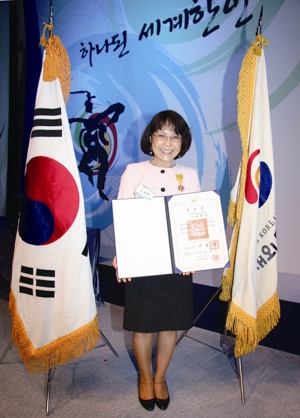Librarian who never gave up on her dream

When people imagine frontiers, the image of a person standing in a desolate and empty area may pop up instantly. Enter Lee Jeong-hyon (‘76, Library and Information Science), also known as Joy Kim in the United States, curator of the Korean Heritage Library (KHL) at the University of Southern California (USC). Armed only with passion and a resolute sense of mission, Lee started off a lonesome journey as a pioneer in a barren field when she was offered a job as Korean Studies librarian at USC.
Upon graduating Ewha, Lee went to the United States and received a master’s degree in Library & Information Science. In 1986, Lee began her library career as Japanese cataloger at the Los Angeles Public Library. She would have preferred a Korean position, but it was practically non-existent at that time. Then USC decided to create a Korean Studies library, and hired Lee. While she received unprecedented support from the university, starting a new library from scratch with no one to guide her was difficult.
“My responsibilities as a Korean Studies librarian required a set of highly specialized skills which the library school did not teach,” Lee said.
“Since Korean Studies librarianship was an underdeveloped field, good literature on the subject were scarce. That is why throughout my career, I have endeavored to influence the Library of Congress to improve the standards on Korean Studies Librarianship.”
Lee’s efforts soon found rich fulfillment. The KHL is now a leading Korean Studies library in the United States. Its holdings include close to 100,000 books, serials, videos, maps, microfilms, and electronic resources.
KHL’s archival collections include the Sea of Korea Rare Maps Collection, the Korean-American Digital Archive, and the Korean Missionary Collections. While the typical Korean collection in North America comprise only 5 to 10 percent of the East Asian Library, the KHL’s collections consist nearly half of the East Asian Llibrary’s total resources at USC. Yale, Duke, and Emory Universities sought Lee’s service as a consultant on starting Korean Studies library. The Korean Government formally recognized Lee’s accomplishments by awarding the Order of Civil Merit, Seongnyu Medal in October 2011.
Lee’s outreach efforts to promote the library and Korean culture include the “Lunch & Learn @ the Library” program, which offers a customized instruction session on library resources, a tour of the library, and Korean food. Lee also works closely with the USC Korean Studies Institute in its academic and cultural programming.
Lee said that working as a Korean Studies librarian overseas affords many unusual rewards.
“I get to meet VIPs to whom I normally would have no access,” Lee said.
“I had the privilege of welcoming such prominent authors and film directors as Yi Mun-yol, Im Kwon-taek, Park Chan-wook. When the then first lady Lee Hee-ho visited the university, KHL served as the venue for her speech and lunch program for which a red carpet and special tables were installed inside the library!”
Lee was once invited to a dinner at the Blue House hosted by the late President Kim Dae-jung, as part of an overseas Korean Studies scholars delegation.
“How many librarians in Korea get to welcome the first lady to your office or attend dinner hosted by the president of Korea at the Blue House?” Lee grinned.
However, the most rewarding for Lee is to interact with the ordinary library users who seek her help daily. One day, a rough looking young man walked in and introduced himself as a Korean adoptee. He had no memories of Korea, but was looking for a stylized Hangul design for the word “resilience” for a tattoo on his body. Lee instinctively sensed that he had led a harsh life as an adoptee, and what he was searching was not mere letters, but a deep longing for his roots and identity.
“To my regret, I could not help him that day,” Lee said.
“Translating the word in appropriate Korean was hard, and finding a suitable design for a tattoo even harder. Ever since, he always stayed in the back of my mind. I now have picked out a word for him: Chiljeonpalgi, which represents the spirit of resilience. I hope he will come back again someday.”
Lee explained that librarians are an integral part of academic life in American universities. Academic librarians have their areas of specialty either in subject disciplines or functional areas. Area studies librarians, on the other hand, perform all areas of librarianship while focusing on a particular geographic region of interest.
What this means is that Korean Studies librarians must perform a wide range of duties, from developing and organizing the collections on Korea, helping the users, and engaging in external relations. Their work often cover the areas beyond the librarianship.
“I am not only a librarian. I am also an archivist, advisor to students, diplomat, strategist, scholar, historian, translator, you name it,” Lee said. “I was even asked to testify as a Korean culture expert in a court on cases involving Korean culture issues.”
Korea’s long history and rich legacy of scholarly and cultural achievements make the work always interesting.
“I never stop learning something new about my own heritage, which is exciting.”
Lee offered the following advice to the young Ewha students.
“I regret not being adventurous while young.I let go of many wonderful opportunities because of the lack of confidence. I would like to advise Ewha students to believe in yourselves, and always adopt a ‘can do’ attitude. Challenge yourself and take up the opportunities laid in front of you with confidence,” Lee said.
“Better yet, create chances to explore the limits of your abilities. Remember that God created you for a special purpose, and is always behind you and rooting for your success. So be courageous. Test and develop your limits to the fullest.”

